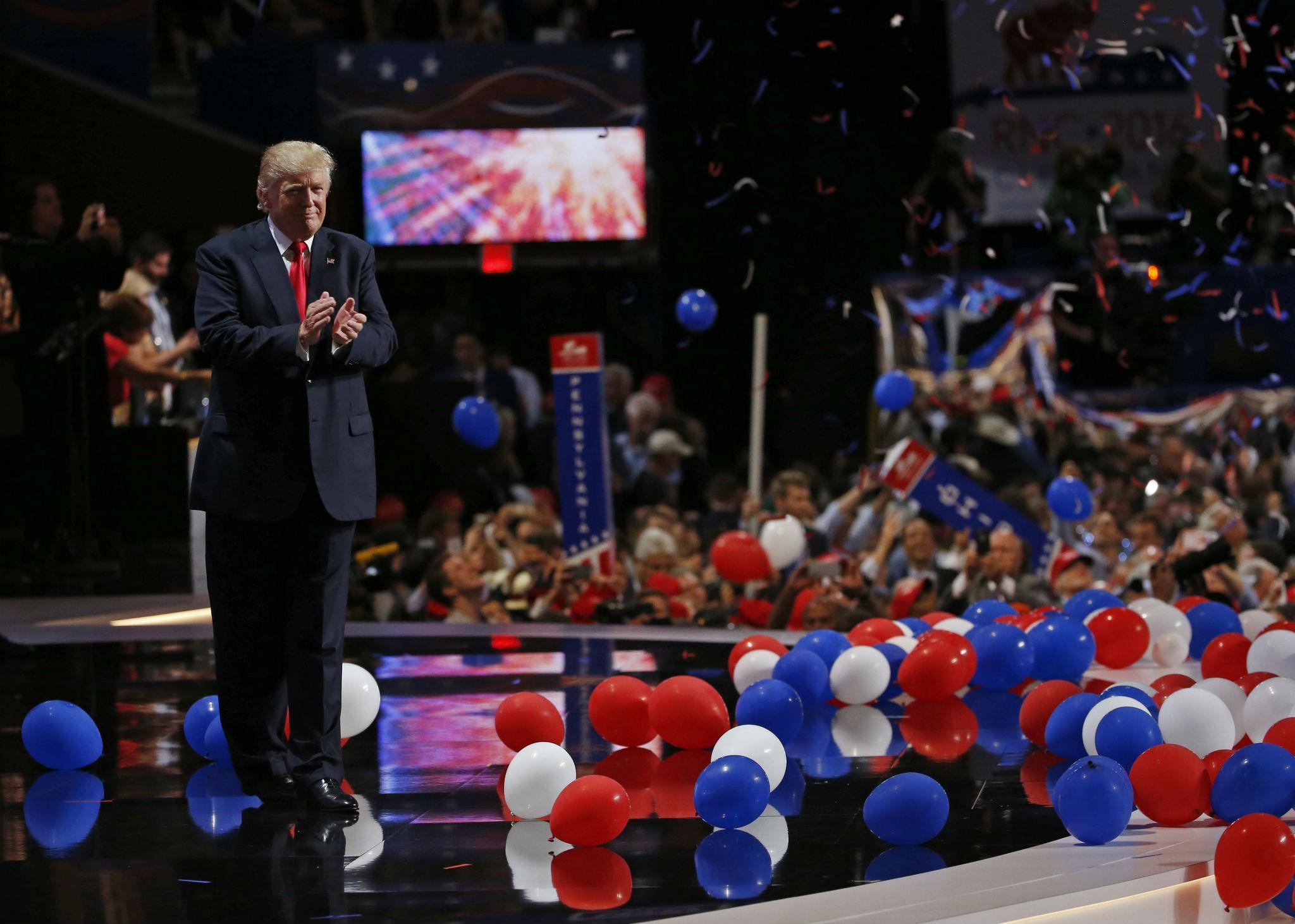RNC 2016: Brexit showed Trump could win the White House, the convention suggested he doesn’t know how
Republicans and Remainers agree on one thing: the Leave vote looked good for Donald Trump - but that doesn’t mean he’s going to be President


Your support helps us to tell the story
From reproductive rights to climate change to Big Tech, The Independent is on the ground when the story is developing. Whether it's investigating the financials of Elon Musk's pro-Trump PAC or producing our latest documentary, 'The A Word', which shines a light on the American women fighting for reproductive rights, we know how important it is to parse out the facts from the messaging.
At such a critical moment in US history, we need reporters on the ground. Your donation allows us to keep sending journalists to speak to both sides of the story.
The Independent is trusted by Americans across the entire political spectrum. And unlike many other quality news outlets, we choose not to lock Americans out of our reporting and analysis with paywalls. We believe quality journalism should be available to everyone, paid for by those who can afford it.
Your support makes all the difference.As the Republican convention lurched between controversy and chaos here in Cleveland this week, it was accompanied by a running commentary from across the Atlantic. Watching in London, a friend wrote on Facebook that she was “now 100 per cent certain” Donald Trump would win the presidency in November. Another texted to say he’d been sick with the same worry, blaming his queasiness on “feeling burned by Brexit”.
Elsewhere in this publication, Matthew Norman suggested Trump “could give his convention keynote address clad in nothing but an anaconda hanging out of his anus” and still stroll into the White House. (He wore a suit and tie.) Last month's EU referendum, Norman wrote, “felt like a transatlantic omen.”
Plainly, in the elite metropolitan enclaves of post-Brexit Britain, people have lost faith in the reliability of polls, the value of facts, the laws of physics. They see, in the primary successes of the Trump campaign, the same spasms of provincial anger that heralded the UK’s nervous collapse. Perhaps, from several thousand miles away, the pouting property mogul’s sheer force of personality looks sufficient to blow him clear past Hillary Clinton.
A lot of Republicans agree. Before he was booed on Wednesday, Ted Cruz was cheered, for hailing Brexit as a sign of voters “overwhelmingly rejecting the political establishment.” Nigel Farage visited Cleveland on what seemed like a motivational speaking tour – Seven Steps to Nativist Success – hoping to satisfy what he said was a “genuine hunger” from his GOP fanboys to learn the lessons of the Leave campaign.

John Burnett, a New York delegate and dedicated Trumpist, agreed that The Donald and The Nigel share a political gene pool. “They’re connected in spirit,” he said. “People everywhere are tired of government and want more control over their own destiny. [Brexiteers] had a strong sense of pride in their country. There’s only one candidate in the presidential race who has that same pride, and who hasn’t placed their country at risk – that’s Trump.”
Leaver and erstwhile Number 10 adviser Steve Hilton, also in town to see the Trump show, said both movements were signs of “a growing dissatisfaction with the technocratic agenda of an insular ruling elite, which is at best neglectful, and at worst dismissive, of its effect on ordinary people. In the US and the UK, those people started to think it didn’t matter how they voted, because nothing seemed to change.”
There are also echoes of Brexit in Trump’s non-traditional campaign methods, Hilton added. “The Remain campaign was a slick, co-ordinated, classic campaign fighting against something much more idiosyncratic. It’s a challenge to the sort of professional politics we’ve seen in both countries since the early 1990s.”
Brexit helps to explain Trump’s rise, but it doesn’t mean that he’s going to win. What Leavers voted for was an abstract, choose-your-own-adventure vision of a future outside the EU. Prospective Trumpists must attach their fears and frustrations to one man. Their vision is non-negotiable – it’s Donald Trump with the nuclear codes.
A convention is an expression of a candidate, and this convention further exposed Trump as a fact-allergic, attention-deficient reality TV star with the intellectual curiosity of a Twitter bot. The plagiarism. The Cruz boos. The shambolic schedule. The obvious reluctance of many professional Republicans to even utter their nominee’s name on the convention stage. These aren’t harbingers of victory; they’re symptoms of a fiasco.
It’s right to be fearful. A Trump presidency threatens not just the US, but Europe and the wider world. If he loses, he has already uncorked dark forces that make him worthy of qualified comparison to despots. Even Farage, the man who unveiled the “Breaking Point” billboard, said Trump’s campaign style made him wince.
But to be a winning presidential candidate, let alone a successful dictator, you really ought to be good at organising things. The Nuremberg vibes of Trump’s interminable Thursday night speech notwithstanding, the RNC felt less like North Korean mass games, and more like a charity celebrity football match. Although that’s not entirely reassuring when you’re in a 20,000-seat arena full of white people screeching “Build The Wall!”
Whipping up racial resentments over immigration may have worked for Ukip in Britain, where the electorate is more than 90 per cent white. In the US, almost a third of voters are people of colour. There aren’t enough angry white blokes to elect Trump on their own, particularly given the outsized animosity he inspires in almost every other demographic. A recent poll put his support among black voters right here in Ohio, a crucial swing state, at zero per cent.
“The Leave side benefited from the fact that every vote in the referendum had equal value,” said Hilton. “In a US election, you have to win states, not votes.” Democrats have won the popular vote in five of the last six presidential elections, while Republican candidates start the race with a slight structural disadvantage in the electoral college. It’s a structure that Trump has so far made little effort to understand, least of all to re-engineer.
Of course, none of that means the Democrats can write him off. And after watching Brexit beat the odds, neither can those quaking Remainers.
Join our commenting forum
Join thought-provoking conversations, follow other Independent readers and see their replies
Comments